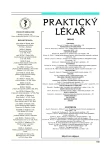-
Medical journals
- Career
Aortal coarctation – an unrecognized cause of hypertension difficult to repair, and its rare primary detection in late adulthood
Authors: M. Černošek 1; J. Novotný 2
Authors‘ workplace: Interní oddělení, Nemocnice Prostějov, příspěvková organizace primář MUDr. B. Černošek 1; Radiodiagnostické oddělení, Vojenská nemocnice, Olomouc primář pplk. MUDr. J. Novotný 2
Published in: Prakt. Lék. 2005; 85(4): 214-218
Category: Case Report
Overview
Coarctation of the aorta is the name of an inborn narrowing of the aortal isthmus, representing 8% of all inborn heart defects. In the overwhelming majority of cases it is diagnosed in childhood and is frequently also connected with a bicuspid aortal valve or other inborn heart defect. In adulthood we come across cases of recoarctation in patients who had been operated on in childhood. The defect has typical hypertension in the upper half of the body and presents a higher risk of there appearing fatal and non-fatal cardiovascular complications such as heart failure, aneurysma, aortic rupture or dissection, endocarditis, endarteritis, and hemorrhagic cerebral stroke. An invasive resolution of coarctation is possible surgically or by percutaneous angioplasty. Aside of the general view on coarctation, in the article there is described a case of a significant coarctation of the aorta, in which there were expressed all the typical signs of the affection, nevertheless, its diagnosis has been made in a patient 62 years of age on occasion of a heart attack. Conservative treatment was decided upon, namely properly administered anti-hypertension medication. Theoretically, the patient would have met the criteria for an invasive procedure, however, in view of the asymptomatic course of the ailment and due to the patient’s age, expected fixed organic alterations, and the high risk of complications connected with such an intervention, surgery was not indicated. Under further follow-up, over three years since diagnosis, the patient under medication remains asymptomatic and there is apparent a regression of certain hypertension-linked organ alterations. This significant coarctation diagnosed at an age of over 60 years represents a rather rare case, and the decidion on further procedures should always be strictly individualized also because there isn’t enough data available on the safety and long-term benefit of a surgical intervention at such old age.
Key words:
coarctation – pathophysiology – therapy – complications – hypertension.
Labels
General practitioner for children and adolescents General practitioner for adults
Article was published inGeneral Practitioner

2005 Issue 4-
All articles in this issue
- Therapeutic protocol of invasive meningococcal disease (IMD) The Therapeutic protocol of invasive meningococcal disease (IMD) is intended for hospital
- The venal cranialis syndrome
- Benign cutaneous pigmented lesions and the various possibilities in their examination
- Chronic hepatitis C
- Musculoskeletal complaints at work with the computer
- Aortal coarctation – an unrecognized cause of hypertension difficult to repair, and its rare primary detection in late adulthood
- Ecchocardiography in the diagnossis of carcinoid syndrome
- Diagnosis of functional gastrointestinal disorders
- Artificial valves and anti-coagulation therapy
- The aggressive patient
- Genetics and ethics – past, present, and future
- General Practitioner
- Journal archive
- Current issue
- Online only
- About the journal
Most read in this issue- The aggressive patient
- Benign cutaneous pigmented lesions and the various possibilities in their examination
- Musculoskeletal complaints at work with the computer
- Genetics and ethics – past, present, and future
Login#ADS_BOTTOM_SCRIPTS#Forgotten passwordEnter the email address that you registered with. We will send you instructions on how to set a new password.
- Career

